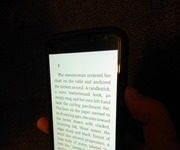I was lucky enough to be taught to read in the era before television: well, it was being broadcast in the mid 1950s, but our set was like a wardrobe with a tiny, round-cornered rectangle of bluish screen that took at least two minutes to ‘warm up’ and, as now, the programmes were hardly worth watching anyway. My school was called Cassiobury JMI, ‘Junior Mixed Infants’. For a long time I couldn’t understand the adjectives. Infants are junior by definition, and while we were certainly mixed I didn’t see any need to rub that in. Later I realized it was two schools in one, for Infants (5-7 years) and Juniors (8-11 years), and we were Mixed by virtue of having boys and girls together.
We had staff of both genders. Ferocious (she was a sweetie underneath) Miss Buckley was contrasted with the indulgent Mr Hazell, who wore a tweed jacket and came to school by bicycle. We were afraid of Mrs Manders, another soft-hearted dragon with nobler goals than personal popularity. Gentle, pretty Miss Lucas reaped the benefit of that.
By the time I reached her class I had already got the basics and, like my peers, could read pretty fluently. Her lessons included ‘comprehension’, which meant analysing a few paragraphs by one of our Better Authors. The chosen text was usually descriptive and contained nothing much to puzzle unduly, and nothing whatever to disturb, an innocent mind. We had to pick up hints (‘how do we know the season is autumn?’) and note the correct use of number and tense. The aptness and necessity of any qualifiers would be discussed. If there were a semi-colon, say, Miss Lucas would explain why that had been used rather than some other stop. Most of all, we were exposed, silently and otherwise, to the rhythm and harmony of expert writing: language as music, as thought-flow, as sacred paint to illuminate the mind, as something that has the power to collapse history and make us see the world through the eyes of another.
Then there was Mr Hazell. I recall him becoming lost in reciting Tennyson to us, mostly from memory, awaking, almost, with a start after the final line. Hazel also was his hair, as were his eyes, and what with the tweed jacket and his twill trousers and polished brown brogues, not to mention his moss-green bike, it was as if he belonged more to nature than the streets of man. By another teacher we were taken on occasional rambles through the adjacent countryside, so that ready images (a bosky riverbank, sunlight on the water, waving tresses of water-crowfoot, bronzing bracken) were available to create a notion of whither he might return each afternoon once he’d put his clips on. It all seemed to be one, poetry and nature, maybe because of his taste in verse, but then everything seemed to be one, that unknown territory beyond childhood.
Reading was a safe way to explore it. I derived a modicum of boyish pleasure in the classroom:
The Eagle
A FRAGMENT
He clasps the crag with crooked hands;
Close to the sun in lonely lands,
Ringed with the azure world, he stands.The wrinkled sea beneath him crawls;
He watches from his mountain walls,
And like a thunderbolt he falls.— Alfred, Lord Tennyson, 1851
yet reading at school was different from the other, freestyle kind. None of us would have dreamt of trying a Better Author for pleasure. That was ‘work’. In our leisure time we boys read comics – the Beano, Beezer and Dandy. The Eagle, which featured a square-jawed space adventurer and his interstellar struggles with the Mekon, was for older brothers, the sort who played with Meccano and assembled plastic construction kits of Spitfires and Wellington bombers. The girls had their own, fluffy comics, Jackie, I think, was one: it probably had a sparkly bracelet taped to the cover one week, a flimsy alice-band the next, whereas the Beano never needed such inducements and relied on Dennis the Menace to keep us coming back for more.
We ate them up, the comics, not realizing our enjoyment depended on the skills given us by Miss Lucas and her colleagues. An odd page or two was devoted to fictive prose. Such pages helped wean us off the flat and fixed and onto the three-dimensional and imaginative. We were slyly indoctrinated in the idea that words on their own could be fun.
Like a liquorice curl or a pink sugary shrimp, an issue of the Beano was soon disposed of, and in the week before the next one appeared we had to make do with other material. In 1957 my family were not well off and had taken a lodger, a frail German lady, a nonagenarian invalid whom we called ‘Auntie’, erstwhile nanny of a family friend – herself elderly now, the daughter of a wealthy family who had lost everything in the 1930s and fled to England. Auntie sported a glass ear-trumpet and rimless spectacles, wore voluminous black chenille and a black choker, and seemed to have a limitless supply of lady-finger biscuits. Even today the taste of these has a Proustian effect on my memory, and an essential part of that is her copy of Rudyard Kipling’s Jungle Book in a rust-coloured binding with Kipling’s swastika peace-device gilded on the front cover. Top-right on the flyleaf, with a fountain pen, she had inscribed her name and added the year: 1897. The book was published by Macmillan. Auntie’s copy may even have been a first edition. She gave it to my elder brother, and in turn I opened it myself.
My favourite story was Rikki-Tikki-Tavi. Immersed in its pages, I lived in the heat and danger of Sugauli; looking up, refocusing, I was returned to the dull, temperate familiarity of a residential road in England. Next, I seem to recall, and simply because it was in the house, I read my brother’s Moby-Dick, bowdlerized for children. One of our local cinemas showed second-run films, and there I saw John Huston’s 1956 version. My little eyes widened at the scene with St Elmo’s fire, and positively saucered as Ahab, harpoon-roped to the White Whale’s wounded back, was borne away from the wreckage of the Pequod. That hadn’t happened in the book: that had been Fedallah’s fate, and he’d been left on the cutting-room floor. Even as the credits rolled I felt the novel, the movie it had made in my head, was better – less simplistic, more detailed and enthralling.
By now I was an addict. My parents were readers too: sometimes our early-evening meal would be designated a ‘read tea’ and, flouting etiquette, we would all have a book open at the table. I joined the local library and was issued with four tickets, valid for the junior section only, most of which I disregarded, since it was crammed with picture-books. I was impatient to access the grown-ups’ shelves. Every paragraph I read educated me for more, but I was very far from being discerning.
It was just the stories – the action – I liked. I would read, legitimately, in bed before lights-out (I had my own little room), and then under a tented sheet with a Woolworth torch. This criminality in a simulated cave, or priest-hole, or chalky tunnel, fitted well with the adventures of Enid Blyton’s Famous Five, all of which I devoured, cursing my yellowing bulb and hoping it would last for just one more chapter. It was then that I first knew the sense of loss caused by a dwindling pile of pages. I proceeded more slowly as the end approached, regretting my earlier headlong dash. I consulted the list of books ‘By the same author’, to see how many treats were left in store; but I also became vaguely aware that Miss Blyton’s talent didn’t quite match up to Mr Melville’s, however clumsily he may have been abridged.
A feature of middle-class life was the Readers’ Union book-club. This issued a wide variety of titles, fiction and otherwise, a year or two after first publication. Our household had a sizable collection of these, together with many other books haphazardly acquired. War-yarns featured quite often, bestsellers about PoW camps in which our stoical, pipe-smoking chaps baited the ‘goons’ and devised ingenious escape-plans. Officers only: the camps were segregated. It all seemed rather jolly, an adult, more spartan version of Billy Bunter’s Greyfriars, with the Kommandant as Quelch. The Hun were beastly, of course, but laboured under the handicap of foreignness and so were more to be pitied than condemned. I saw myself at Stalag Luft III, digging away under the wooden horse or releasing sandy soil down my trouser-leg as I sauntered about the compound. I dodged machine-gun fire from the guard towers and fled into the nocturnal fir-forest, then slept in ditches, stole a bicycle, was given food by a tender lass who discovered me dozing in her father’s straw; risking her life (the unspoken mutual attraction passing high above my head), she conducted me to a contact in the resistance who helped me on my way to neutral Sweden, there to board ship and return to my squadron at Tangmere. This was a step up from Blyton, to be sure, and I believed every word. Bare facts about the despair of captivity were supplied: I sensed that it had been, at bottom, a serious business, but didn’t twig that understatement had been one of the traits that had let my country endure till the Japanese brought the Americans in. I was unwittingly absorbing cues about the national psyche, and because the books were so well written and edited I was also absorbing a feel for technique – narrative flow, felicity, vocabulary. These I took for granted every bit as much as I had the remarkable lessons I had received from Miss Lucas.
Narrative flow – storytelling – has two components, the expected and the unexpected. By the ‘expected’ I mean those elements of the story with which the reader will be familiar before he starts. These are of two broad sorts: the background or setting, which persuades him that the unexpected is believable; and conventions of story-telling, such as the linearity of time, or certain actions having predictable consequences, or an ascending plot-structure that leads to an emotional payoff in the form of a happy ending.
The ‘unexpected’, or ‘unfamiliar’, comprises, first, those parts of the background that are new (e.g. descriptions of a place the reader previously knew nothing about) and, secondly, the motivations and consequent deeds of the characters – some of which may actually be ‘familiar’, inasmuch as he has already experienced something comparable himself, whether first-hand or otherwise. As he reads any particular story, its unfamiliar is transformed into the familiar, and as he grows older and reads more and more stories, his gathered experience makes him familiar with elements of new stories that a novice will find ‘unfamiliar’.
When small children insist on hearing, yet again, a tale they know by heart, it is because the familiar is comforting. The familiar confirms us in who we are. It helps us to integrate with our social group, whatever that may be – family at first, then class, nationality, and, if we persist, the human race as a whole. The familiar is the oldest element of story, the cohesive force that kept our ancestors enthralled as they sat listening to the shaman’s tales.
The performances of modern actors vary a little from one evening to the next. I’m sure the shaman varied his performances too. He would have done it to stop himself from getting bored, or for the sheer fun of making things up – the feeling of power the fabulist has over his rapt listeners. As the audience grew more sophisticated they would have begun to delight in this novelty also. New stories would have emerged from new experiences for the clan, and what had been strange or frightening would have been assimilated into lore.
We love to gossip and hear the news. This has obvious survival value for a social animal: that may well be its origin. Gossip, the news, non-fiction in general, is also a kind of narrative, entertaining or informative in its way, but unreliable. The reporter may only have had partial access to the facts, or be influenced by commercial pressure or a political belief that causes bias. Paradoxically, fiction is often more truthful than non-fiction, and sincere fiction is the most truthful narrative of all.
In those elements of a story that are pure invention, the storyteller makes no claim to factual accuracy. On the contrary: for fear of libel, he may even announce that his characters ‘bear no resemblance to any person living or dead’. Accuracy is only claimed for the familiar, the ‘research’ that serves to make the unfamiliar convincing. A reader who finds a mistake in the research becomes impatient with the whole story. A mistake pricks the bubble of suspended disbelief and calls into question the competence of the author. In written stories, the familiar also encompasses the rules that have accreted around spelling, etc., and the bubble will be pricked by mistakes there too.
The familiar has to be scrupulously correct. It is the launch-platform for the unfamiliar. The more solid and reliable the familiar, the more fanciful can be the unfamiliar. That is why successful science fiction casts an everyman as hero. The reader finds it easier to identify with such a character, enabling the author to get away with less familiarity in the setting: although even here, if examined, the setting will be found to have much about it that is familiar. Think of the beginning of Ninety Eighty-four. The clock strikes thirteen, but then Winston Smith is confronted with the smell of boiled cabbage. Throughout that narrative, George Orwell again and again demonstrates his masterly skill in weaving the familiar with the unfamiliar. Aided by his flawless English, he builds such a convincing platform that when we come to the climax – when Winston cries ‘Do it to Julia!’ – we are completely engaged and profoundly moved.
Fiction like that is overtly truthful, because a sincere author does his best to build a persuasive version of the familiar. In so doing he reveals a lot about himself. The reader enlarges his knowledge of the world partly by means of the various representations of reality he encounters in his progress. This is, perhaps, almost as rewarding as the psychological insight offered by the most advanced aspect of the unfamiliar: authors’ recombination of elements of their own lives.
Both the familiar and the unfamiliar tell the reader about the writer, but in different ways. In Rikki-Tikki-Tavi, Kipling is careful to provide his young, middle-class audience with a young, middle-class protagonist, made yet more identifiable by his conventional relationship to his conventional family. The author can then risk the exotic setting (Bihar) essential to the story of a mongoose (Rikki, the goody) in his struggle to defend the family from a pair of malevolent cobras (Nag and Nagina, the baddies). The story itself is necessarily conventional, with the expected (i.e. familiar) happy ending.
The more exotic the setting, the less exotic should be the plot, and vice versa. Stories with exotic characters, setting and plot are usually dismissed as unbelievable, because the reader cannot get a handle on them: there is nothing familiar. In Rikki-Tikki-Tavi much of the setting, together with the cast of animals and birds, comprises the unfamiliar; the rest, including the plot, is familiar. Kipling would have been aware of this. He was a sublime craftsman, but did he know exactly what he was doing? I don’t think so. Was he sincere? Most likely. The piece educates us about the Raj but inadvertently also tells us about the author, his world-view, and the society in which he grew up. Nag plans to kill the family, to rid the house of the whites, so that the cobras can again hold sway. For Nag and Nagina, read ‘the misguided, resentful, nationalistic Indians’; for Rikki, read ‘a valiant, enlightened Indian, grateful for the benefits of British rule and content to be treated as a family pet’. It is not just a tale for children, but a subtle (and, I believe, almost entirely unconscious) exercise in jingoism. Perusal of his other works reveals that Kipling was indeed jingoistic, or patriotic, as doubtless he would have preferred to be called. He was a man of his time and of one of the greatest empires the world has ever seen. Gone now, but that little mongoose gives an insight into the mindset that enabled it to flourish. (In Russia in 1966, at the height of the Cold War, an animated version of Rikki-Tikki-Tavi was released, directed by Aleksandra Snezhko-Blotskaya. This notably substitutes a native family for the whites. The storyline was strong enough to survive, but not the politics.)
When I was a small boy Britain still had an empire, though it was shrinking, and most of the adults around me agreed with its values. Kipling’s assumptions would have reinforced my world-view, such as it was. The same with Enid Blyton’s Famous Five, which depicted an ideal society of well-adjusted children, responsible parents, and marginalized ‘crooks’ who always got caught in the end: propaganda, in other words, but disseminated with the best of intentions by its author, publisher, and everyone else in the chain between Blyton’s desk and my torchlit cave. We consume such books partly for reassurance, confirmation of who we are, but not all of us are content to go on consuming them indefinitely.
Even in the children’s version, Moby-Dick is far more challenging than Rikki-Tikki-Tavi. Again the author is careful to provide a sympathetic and readily identifiable lead, although Ishmael turns out to be little more than a bland narrator: the protagonist is Ahab, the deuteragonist the whale. In the opening pages we learn to like and trust Ishmael. We flatter ourselves that he resembles us, an ordinary person doing his best, though sorely afflicted with the wanderlust that lurks in us all. The familiar continues when he arrives at the inn. Just as we would be, he is disgruntled to learn that he must share a bed with a stranger. But when Queequeg appears, things start to get interesting. He could hardly be less familiar, a hideously tattooed cannibal carrying a lethal harpoon and worshipping a homunculus. Ishmael is terrified. Then, slowly, as Queequeg’s admirable personality emerges, Ishmael’s prejudice evaporates and the two men become friends.
Melville transforms Queequeg into part of the familiar. We come to like him just as much as we like Ishmael, or even more; and a little of our own adamantine prejudice is thus wafted away. This is clever writing, for it also solves a technical problem. Queequeg’s transformation prepares us for the easy absorption of further extreme unfamiliarity. Before we know what has happened we feel at home aboard the Pequod. We are of the crew. Our own fate is bound up with Ahab’s obsession.
Just as Queequeg was transformed, so now is much of the unfamiliar in Moby-Dick. Ahab’s thirst for revenge is allowed to dominate, while the setting and the supporting cast become familiar, accepted, relegated to the background. Everything and everyone on board are subordinate to and focused upon the captain’s monomania, so that when the whale is finally engaged what results is a clash of two incomprehensible titans. It is a wonderful story, adumbrating mysteries of morality that have no name. These mysteries cannot be retrieved from the realm of the unfamiliar, so cause us to reflect on them once we have finished the book.
In its unexpurgated version Moby-Dick is a highly sophisticated work, revelling in the joys of language and in knowledge for its own sake. An extended vocabulary is another benefit for the persistent reader. He is further enriched by an awareness of literary tropes and allusions, but a more important side of his progress is his growing ability to see into another’s mind.
In the whole field of art, I can think of no rival to literature in its capacity to let us share someone else’s psyche. A story is superficially divided into the familiar and the unfamiliar; its composition is divided into the conscious and subconscious. The subconscious part, like Kipling’s assumptions in Rikki-Tikki-Tavi, is usually the more interesting. Unlike most human discourse, including the conscious part of an author’s output, it is entirely free of deceit. After Animal Farm or Nineteen-eighty Four, we know more about George Orwell than his biography can ever tell us. He was a professed man of the Left, but so fastidiously honest and self-effacing (this is borne out by the transparency of his prose) that he could make no apology for the failures of socialism. We see through the tribal Labour Party badge: we see the humanitarian underneath, and our world-view – whatever our political beliefs – is ameliorated as a result.
Those two novels are an exercise in polemic, preserved – elevated – from that dreary genre only by Orwell’s ability as a storyteller. Moby-Dick is higher, towering, inspired, transcendent. Huston’s film threw nearly all of that away. The script was written by Ray Bradbury, who disliked the novel and didn’t get on with his autocratic director. What remains is little more than a time-passing thriller, exciting enough in the communal atmosphere of an auditorium, but ultimately unsatisfying.
The young Melville’s seafaring adventures provided the ideas for some fairly conventional stories, like Typee and Omoo. They were commercially successful; his later books were not. His declining sales warred with the urge to satisfy his muse, and he must have seen how far short, in that respect, he fell compared with his friend Hawthorne. Moby-Dick was published in 1851, when he was thirty-two. For the next forty years his writing became increasingly mystical and, at the last, impenetrable.
The secret joy of reading, its greatest pleasure, is this: by merging our psyche with an author’s, we keep our grip on reality while temporarily renouncing what eastern philosophy terms ‘the self’. In quiet solitude we open our heart and join the commonalty of mankind. Queequeg becomes a brother whose death we mourn. Fiction may entertain and even educate, but above all it is a tool to help us grow. That is why we leave Enid Blyton behind and long for our tickets to the grown-ups’ library, and that is why we are drawn to the unresolved mysteries of the unfamiliar in fiction, for these are the very mysteries of existence itself.





































This is an excellent article: thankyou.
Rikki-Tikki-Tavi was one of my early-chilhood reads, too. I had some collections of short stories which took me on wonderful journeys.
The journeys continue. 🙂
I used to read you blog frequently, I can’t believe I ever stopped! Now I remember what got me addicted overall.